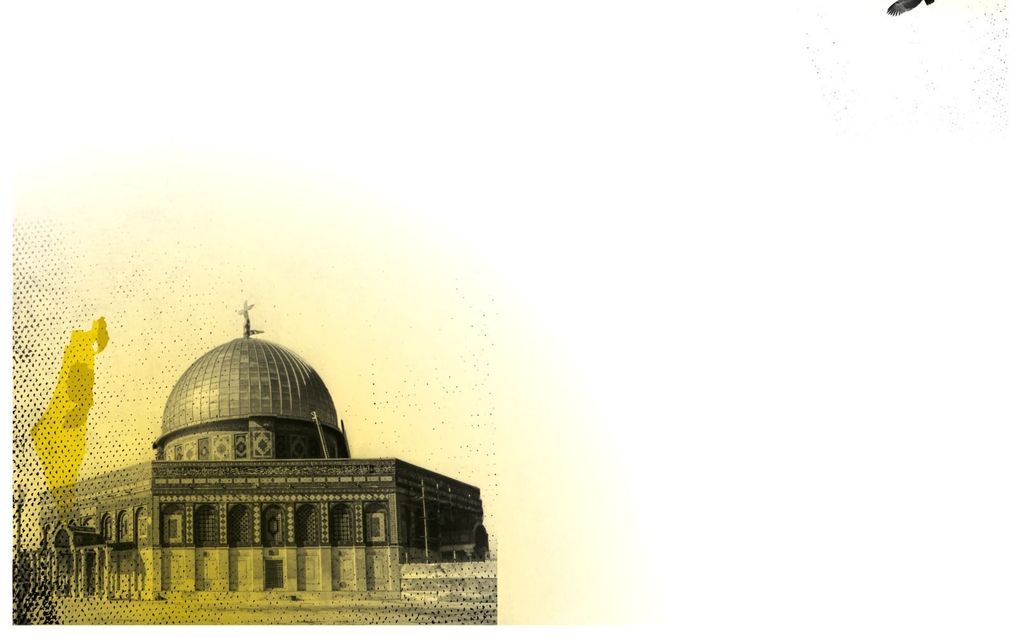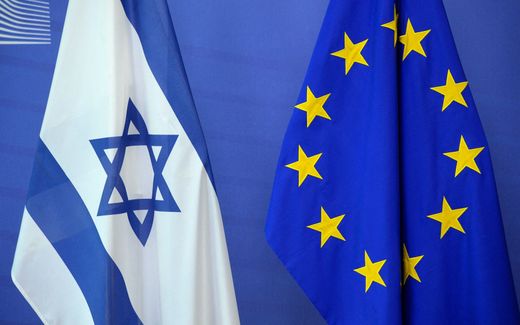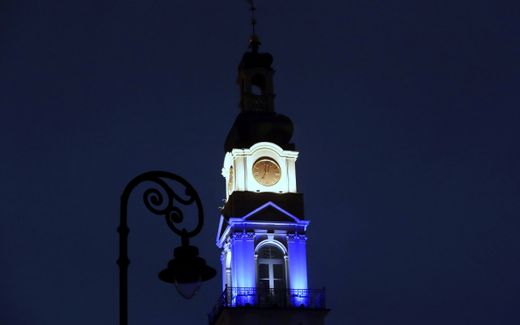What does the Bible say about Muslims?
31-10-2023
Opinion
Jacob Hoekman, RD

Photo RD, Corné van der Horst
Opinion
Just to be honest. Have you heard anyone say in recent weeks that if Israel had exterminated the nations of ancient Canaan, there would be no war with the Palestinians today?
Another question. If Abraham had been a bit more patient and had not fathered a son by Hagar, wouldn't the problems with Muslims have been avoided? Surely they are the descendants of Ishmael?
In the war between Israel and Hamas, both questions converge. Hamas relies emphatically on Islamic principles, which quickly gives the war against Hamas the image of a war against Islam.
This is also exactly what Hamas wants. The attack on Israel on October 7th was called Al-Aqsa Storm by Hamas, referring to the Al-Aqsa mosque on the Temple Mount in Jerusalem. Al-Aqsa is a name familiar to just about every Muslim worldwide. By referring to the attack this way, Hamas is trying to show that this issue should be a core concern for every Muslim anywhere.
Sympathies
Of course, by no means every Muslim falls for this trick, but the tone has been set. In the increasingly heated discussions, it is soon about Jews versus Muslims and about where "our" sympathies should lie. So about us versus them, with Muslims forming the historical "them" - just as Jews were for a long time in Europe, by the way.
Regarding the Jewish people, however, there has been a change in most Dutch Reformed churches. Earlier, many believed in what is known as Supersessionism. However, this view has been and is being abandoned; it is no longer so easily said that the church has replaced Israel. The idea that there are still outstanding Biblical promises for the Jewish people, as in Romans 11, is instead widely accepted.
But what about Israel's Arab brother nations? Are there promises for them too? And what do they mean in practice? Can they change how we view the suffering in Gaza, for example?
In this article, I do not claim to provide the ultimate answers, but I hope to offer an analysis of the answers these questions have received in history. I do so partly on the basis of research I have done before.
Vacuum
What is immediately striking to me is that with the same Bible in hand, very different answers have been given to the question of whether a hopeful vista may be painted for Ishmael. Bible exegesis is not an activity that takes place in a vacuum: concrete historical occurrences are apparently very decisive for what we read and how we read it.
Usually, the concrete historical context was one of struggle. Throughout the long Middle Ages, war between Christian Europe and the Islamic Middle East was emphatically in the foreground.
The Crusades -between 1100 and 1300- are the best-known and most notorious example of this. Many Muslims like to cite that example as support for the thesis that Christians were not always as peaceful with their neighbours as they sometimes pretend.
Pagan
For many long centuries, Christian Europe saw the Muslim, in short, above all, as the pagan, the infidel, the enemy. The ultimate other.
Even in the time of the Reformation and the Later Reformation, that hostile image continues to prevail. Little by little, there is more space for Biblical promises for the Jewish people. But for Muslims? Not really. Martin Luther speaks of a "satanic line" running through Cain and Arius to Mohammed. Note: these are the years when the "Turk" is at the gates of Vienna. Things are serious for Luther; his theology is not something theoretical but is directly related to what is happening in Eastern Europe.

Calvin, too, was not mild when it came to Muslims. He is particularly vehement in a sermon on 2 Timothy 1:3, in which he accuses Muhammad of having given his followers "the cup of his devilish dreams" to drink, "and they became drunk with him". Calvin does realise –in a sermon on Galatians– that Ishmael is the eldest son of Abraham, but that is mainly an "empty title" used by Ishmael to oppress Isaac.
Positive voices on Islam and Muslims are rare and remain so in the Later Reformation. Polemical language prevails, even among the great Reformation authors on Islam in those days. That is Simon Oomius, a pupil of Voetius. He wrote a book of almost a thousand pages on Islam and wants to have nothing to do with all kinds of promises for Muslims that Roman Catholic theologians think they see in the Word. These are "dreams" from the "brains of drowsy and melancholic people", Oomius believes.

Evil
In general, therefore, in this long period from the Middle Ages to somewhere around the 1800s, what 20th-century missiologist J.C. Hoekendijk wrote is true: "The evil rumour concerning Islam has almost become a cultural pattern of our Western society". And this does not only apply to Ishmael. Promises for Isaac have also been barely recognised for long centuries.
But then a new era dawns. The Ottoman Empire is losing strength, and the threat of Islam is receding into the background in Europe. It is the 19th century, the time of several revivals in Europe and also of hopeful engagement with Muslims - and more specifically with the Arabs. No longer is the focus mainly on the demarcation against Muhammad; it is now more about compassion for the Prophet's followers.
One religion
For instance, Dutch philosopher Willem Bilderdijk (1756-1831) even sees in the followers of Islam a people closer to God than the enlightened Christianity of his day. He hopes that Christianity and Islam will become one religion when the Arabs start professing Jesus.
Isaäc da Costa, together with Bilderdijk, a figurehead of the revivals of the 19th century, also has a lot to say about this around 1820, especially in the form of poems. Da Costa, himself a Messianic Jew, is convinced that there is a lot to come for Arab peoples. But first, the Jews must come to Christ, he argues. After all, the firstborn right was for Isaac, not Ishmael. As long as Jewish Isaac does not turn to Christ, he himself is guilty of the Muslim Ishmael possessing only half the truth.

Now, Da Costa is not making his hopeful expectations up: in his poems, he quotes prophecies almost verbatim from Isaiah 60, among others, where it says that Kedar and Nebajoth-both sons of Ishmael-will honour God with their rams and camels in Jerusalem.
Another quoted text is Genesis 17:18, where Abraham asks God to also bless his son Ishmael – something God promises him.
There is also Isaiah 19, a well-known prophecy in which a thoroughfare runs from Egypt to present-day Iraq, right through Israel. The nations along that road will worship God together. This is a passage on which more reflection is needed, wrote the Dutch Dr J. van der Graaf in 2006. "That there are also promises for Ishmael is a necessary correction in the thinking of all who have a one-sided expectation for Israel."
Condemnation
Meanwhile, it is 2023. The perceived threat posed by Islam, especially since the attacks of 11 September 2001 and the rise of Islamic State in 2014, is back in full force. So is the polemic of the time of the Second Reformation because, as we have seen, more perceived threat usually means sharper condemnation, including theologically.
Yet the line of hope, that of biblical promises for Muslims, has not disappeared. It has definitely taken hold since the days of the Revivals in the 19th century. Internationally, that line is followed today by theologians such as the Lebanese Tony Maalouf and the Pakistani Faisal Malick. In the Netherlands, it was initially mainly Iet Bleeker who was convinced of God's plan for the Jewish and Arab peoples. She worked for the Near East Ministry in Israel for many years and died in 2005. Today, it is especially the former director of the Dutch Arab World Mission organisation, Jaap Bönker, and former missionary Laurens de Wit, who write a lot on this theme.
Theologically, not everyone will be able to follow every step, but what is striking is that these authors, who highlight the biblical promises for Ishmael, without exception, also take seriously promises for the Jewish people. At the very least, this shows a theological consistency: if there are promises for Ishmael, then surely also for Isaac, through whom the great Messianic covenant took shape.
That focus on both Jew and Arab transcends deep divisions, Jaap Bönker said earlier in an interview with the Dutch Christian daily Reformatorisch Dagblad. But often, that attitude is not understood. "We live in a strange little country. In the Netherlands, there is a very strong rule: if you are for Israel, you are against the Palestinians, or vice versa. You have to make a choice. But my great example, the Lord Jesus, does not make that choice. He has a plan both with Israel and with the Palestinians. You have to see that plan separately from the political background."
War
The results of that renewed openness to both sons of Abraham, both Isaac and Ishmael, are sometimes stunning. For instance, they put the war over the small piece of land where Israel is now fighting Hamas in a whole new perspective. What if the Promised Land is much bigger than that? What if the land promise from Genesis 15, with borders from Egypt to the Euphrates, was meant literally? What if that land is meant not exclusively for Isaac but for all of Abraham's seed, including Ishmael?
The implication, then, is that the sons of Abraham are already living in the Promised Land, but they do not yet favour one another. And that they will only grant it to each other through Christ. Authors like Tony Maalouf and Laurens de Wit are well aware of this. Islam did not arise by accident but fits into God's plan, says De Wit. That is his answer to the questions with which this article began. Is Ishmael's existence a consequence of unbelief? "Then go further. Nor was it God's intention for Adam and Eve to eat the fruit. But when they did anyway, God had his plan in place."
The aforementioned authors point to developments that show something of that plan. Never before have there been so many Messianic Jews as there are today. And never before was the church among Muslims in the Arab world growing as fast as it is today. "They don't yet see that they are brothers," Jaap Bönker says of this. "But that moment will come."
How such a theology might affect the view of the war between Israel and Hamas, I cannot oversee. But that it produces a vision that has an eye for a future for Jerusalem as well as Gaza, that is clear.
This article was translated by CNE.news and published by the Dutch daily Reformatorisch Dagblad on October 28, 2023
Related Articles












